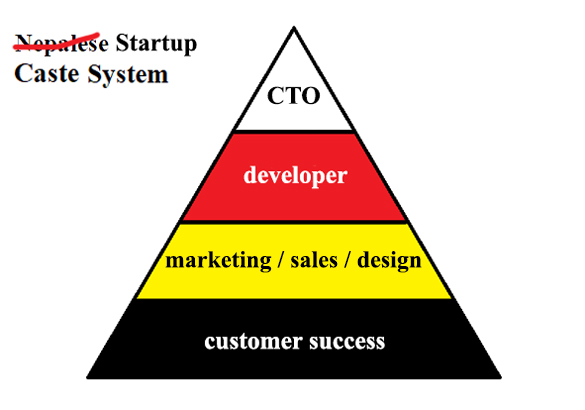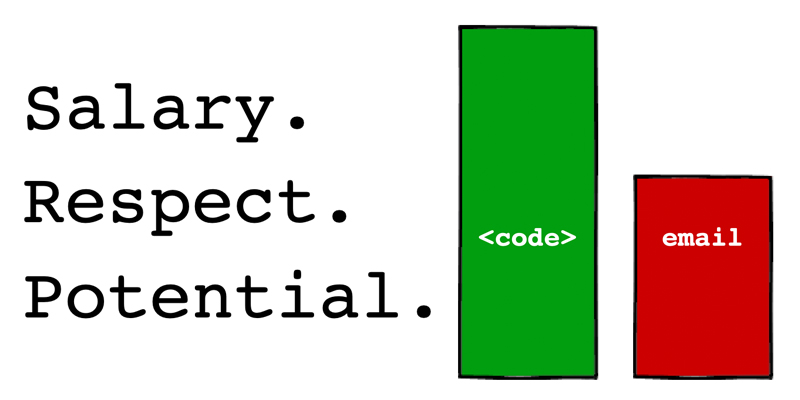in the technology industry you either write the code or sell the code.
if AOC achieves a world without farting cows those distinctions may be just that. but in reality there is no startup “ecosystem,” it’s a caste system.

i don’t think this is cool but it’s the truth so i’m reporting it.
marketers who don’t know how to build products — yet rely on built products to survive and advance their career — have two choices:
- learn to code
- be proud they don’t know how
most marketers choose #3: shame and embarrassment. i know, because i used to be one of those marketers.
industry events
marketers at tech conferences are like slightly chubby people who “let go” last winter and now have to face a beach day.
they go to events and blurt out things like “oh, i’m not technical” when someone asks what they’re working on. no one taught them to say this, they do it instinctively, like cats hunting rodents.
being “non technical” in the tech industry is a Scarlett Letter.
for this reason i want to deter as many people as possible from choosing #2.
it’s the Fat Positive equivalent for your career and guess what: fat people don’t live as long (by 5-20 years) as fit people.
Justin Bieber
it’s actually an anomaly there is such a thing as a technology career without knowing how to build it.
just look at the music industry. can you be a producer without Pro Tools? without being able to riff a couple piano chords? understand the circle of fifths? time signatures, key signatures?
a musician for 16 years, i still refine my craft. most recently i spent 6 weeks in Los Angeles at a production “bootcamp” to get better at compression, EQ, and arrangement.

i’ve performed 100s of times around the country and recorded albums in 7 professional studios. and music is just a hobby!
doesn’t that which pays your rent, buys your food, and sends flowers to your mother deserve more attention?
excuses
marketers are excellent Excuse Makers.
i try to empathize because i used to be a champion excuse maker myself. “i just need to raise money, to hire the people, to build what i want” is the mantra. but then i wrote the best post on learning to code and haven’t looked back.
the “co-founder” philosophy hasn’t helped. it discourages Renaissance makers. the best companies of tomorrow will be founded by individuals with a vision, not friends with an idea.
solutions
in a perfect world there wouldn’t be developer elitism, only camaraderie between technical and non technical functions of an organization.
engineering peers wouldn’t feel (or even be paid) more than you, because your work (acquiring customers) is indeed more important and more difficult than theirs. i’ve maintained this unpopular opinion publicly for years.
but nobody said you have to be a CTO. you can learn to hook up JavaScript event listeners, write scripts, build “research” scrapers, and bang out a prototype over the weekend. you can do this, and you ought to.
in the words of my new mentee Will, our duty in tech is to “build what we know,” and build it with our own bare hands.

What about designers? Where do they fit in the startup cast system? (I’m not a designer)
fair question, i’ve updated the visual.
but its purpose is to highlight business <> engineering tension specifically.
designers don’t typically aspire to code. and IMO, they *shouldn’t* waste time writing code, they have a gift. coding is for monkeys.
I will be writing a post on this sort of thing myself soon as well, with a slightly different angle. The gist: in all things, it would seem (wrongly) most of us fall to one primary discipline or another we market the thing that creates value or we create the thing that creates value.
The problem comes when we feel we must immerse (specialize) in one– to segregate ourselves, to extend your metaphor, into these castes.
It’s not a necessary dilemma. Both are required.
So clearly I agree it’s a copout to say “that’s someone else’s job” (for basically anything), I am simply more agnostic about how one might accomplish integrating (to co-opt your own terminology you so deftly used re: work/life coexistence) both capacities.
You mention music. One of the best music producers of all time– Jerry Weintraub– promoted Elvis. He wasn’t musical. That was ok. That said, he was certainly INTEGRATED with his work. He knew it very well. His hands-on job might not have involved running the tape reel, mixing, editing or doing background vocals. Didn’t matter.
And he was not alone with this. I worked with Oscar-award winning Hollywood producers that wouldn’t know which end of the camera works (essentially). But they are great at what they do. In their own sense, while the core of what they do would, given the required dichotomous designation, fall under the realm of “marketing,” they do so creatively.
Put more simply, it’s their CRAFT. Not their job.
Put even more simply, when you view your work as a craft, your job as a creator– the tools are immaterial.
In a highly technical world, yes, that would likely require a marketer to get technical skills. But that’s merely incidental to the larger issue.
A creator will do so because that’s what it means to create. A “hack” would avoid that b/c “that’s not my job.”
Make sense?
Anyway, terrific points and thank you for posting. Helped me clarify my own thoughts on the subject!
Funny things is, once you stack on different kind of skills, you see many possibilities. Marketing + code + deep knolwedge of an industry = $$$
Discovered your work a few months ago and really like it, thank’s for sharing!